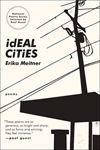
|
So here is Ideal Cities, Erika Meitner’s second poetry collection, opening with “North Slope Borough,” a narrative that gets it—how sharply patterned metaphors can flash and blur so our narrator’s heart becomes an Alaskan fishing village, her mouth a zipper, her mind’s eye a vision of the F train in Brooklyn as quickly as one sweeps the hair from one’s face. Such a thrilling description-turned-meditation—and this book is particularly attentive to that rhetorical tradition—wants each image, each memory, to shadow, singe, and re-describe another. The poetic legacy here is hybridity: poem as remembrance, poem as event, poem as bursting. “North Slope Borough” is an apt signal for a collection that feels intensely awake, restless, and dream-like at once. What Ideal Cities wrestles with is love and disappointment, identity, what it means to be a mother, daughter, to be heartened and alive. To remember stumbling home with a lover, confessing, “it doesn’t seem like an accident / the summer is always gin-soaked,” while the night is “holding its breath / for things gone / missing” (“Small, Generic Towns at Night”). To wring from a grandmother’s experience in Bergen-Belsen, “bare-shouldered trees / like the thinnest trip-wires / the name of the unnamed / over and over, hollow / bones scraping the space / nothing could reach” (“1944”). To experience language squeezed tight so the reading transforms into the straightjacket it describes, as in the exquisite “Miracle Blanket,” a poem about a swaddle blanket that verges on prayer. These poems move (and are moving), committed to an experiment where hardly a single image or idea remains itself for long. Yet within that experiment Meitner’s poems don’t pine for avant-garde styling. They don’t explode syntactically in a manner that feels self-conscious. Rather Meitner has offered voices—intelligent, full of empathy for the fracturing world they address—that make these poems feel innovative and perennial. A novel concept: poems with as much heart as irony. When the reader finishes the last poem, “May the World to Come Be Neon, Be Water” (beginning playfully with “because my shoes are too tight”’) they come away re-engaged, not only with the experience of language, but with the experiences that that language re-describes in its amazement. Ideal cities are where the neighbors who they bother because who doesn’t like the Holy Ghost for a living… are a multi-generational who puts chairs to save a spot This poem’s structure, oscillating couplets, manages play and possibility. The poem makes no apologies for what it believes: clearly these ideal cities exist. They’re here, in the poems, where Meitner has set the language loose. The way “Ideal Cities” winnows to that strangely singular and plural image—our moving truck—represents the warm hope that all of us, any minute now, could be heading to something better. --Matthew Guenette Matthew Guenette lives in Madison, Wisconsin. His first collection of poems, Sudden Anthem, won the 2007 American Poetry Journal Prize (Dream Horse Press), and his second book of poems, American Busboy, will be published by the University of Akron Press in 2011. For more information, visit www.matthewguenette.com. |
